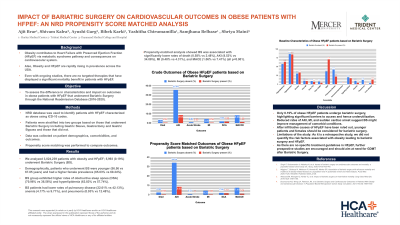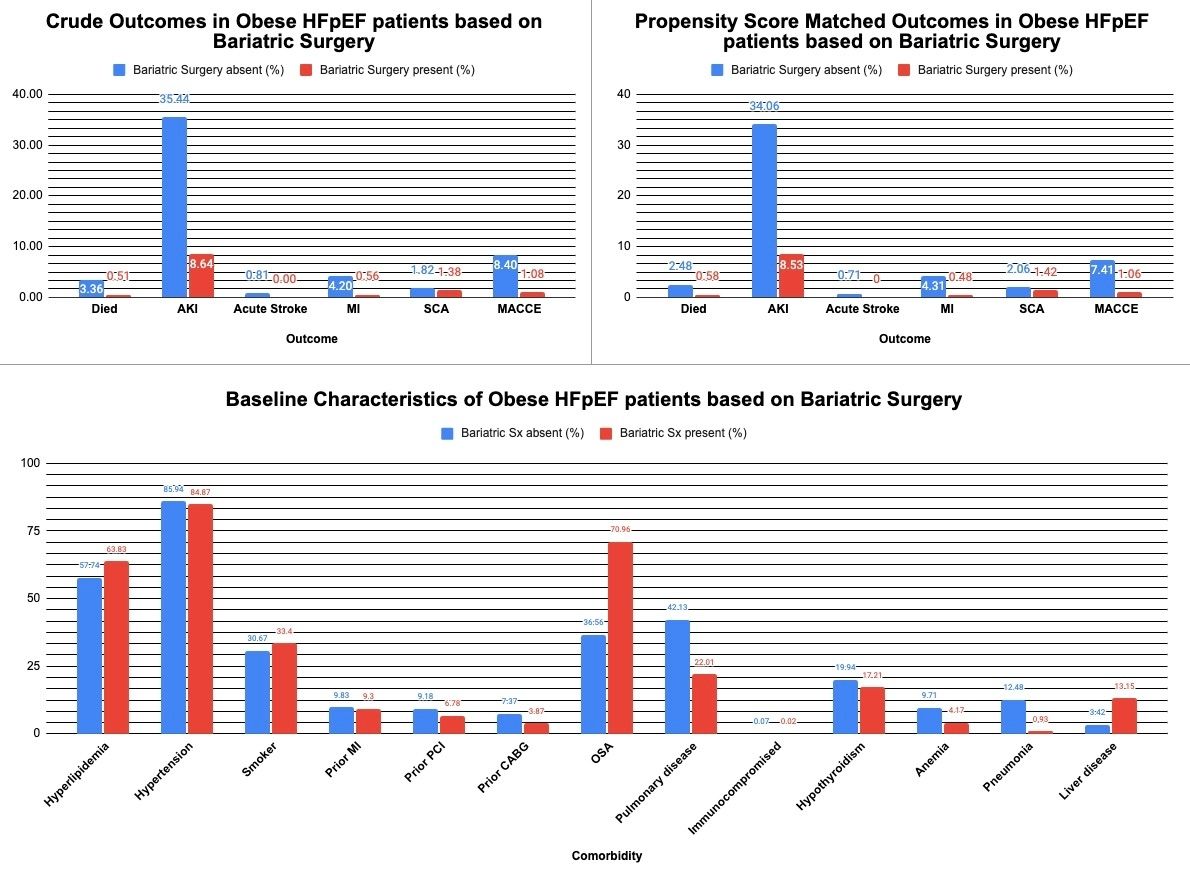Sunday Poster Session
Category: Obesity
P1439 - Impact of Bariatric Surgery on Cardiovascular Outcomes in Obese Patients With HFpEF: An NRD Propensity Score-Matched Analysis
Sunday, October 27, 2024
3:30 PM - 7:00 PM ET
Location: Exhibit Hall E

Has Audio

Shivam Kalra, MBBS, MHA
Trident Medical Center
North Charleston, SC
Presenting Author(s)
Ajit Brar, MD1, Shivam Kalra, MBBS, MHA2, Ayushi Garg, MBBS, MHA2, Bibek Karki, MD, MPH1, Yashitha Chirumamilla, MD1, Samjhana Belbase, MD1, Shriya Maini, MBBS3
1Hurley Medical Center, Flint, MI; 2Trident Medical Center, North Charleston, SC; 3Dayanand Medical College and Hospital, Ludhiana, Punjab, India
Introduction: Obesity contributes to Heart Failure with Preserved Ejection Fraction(HFpEF) through escalation of metabolic disease, cardiac damage and alteration of hemodynamics. Furthermore, Obesity and HFpEF are rapidly rising in prevalence across the USA. Despite this, there are no targeted therapies that have displayed a significant mortality benefit in patients with HFpEF.
We aim to study the difference in characteristics and impact on outcomes in Obese patients with HFpEF that underwent Bariatric Surgery through the National Readmission Database(2016-2020).
Methods: NRD database was used to identify patients with HFpEF characterized as obese using ICD-10 codes. Patients were stratified into two groups based on those that underwent Bariatric Surgery including Gastric Sleeve, Gastrectomy and Gastric Bypass and those that did not. Information was collected on patient demographics, comorbidities, and outcomes. Propensity score matching was performed to compare outcomes.
Results: 3,024,239 obese HFpEF patients were included. Of these, 5,993 (0.19%) underwent bariatric surgery(BS). The patients in the BS group were younger (56.56 +- 0.19 yrs vs 67.85 +- 0.4 yrs), and had a higher prevalence of females (65.03% vs 60.24%) in comparison with the non-BS group. The BS group had a higher rate of OSA (70.96% vs 36.56%), hyperlipidemia (63.83% vs 57.74%), smoking(33.4% vs 30.67%) and liver disease (13.15% vs 3.42%). On the other hand, BS group had a lower rate of prior PCI(9.3% vs 9.83%), prior CABG(3.87% vs 7.37%), pulmonary disease(22.01% vs 42.13%), Immunocompromised status(0.02% vs 0.07%), hypothyroidism(17.21% vs 19.94%), anemia(4.17% vs 9.71%) and pneumonia(0.93% vs 12.48%). In the propensity score matched analysis, BS group had a lower rate of death(0.58% vs 2.48%), AKI (8.53% vs 34.06%, p< 0.001), sudden cardiac arrest (SCA)(1.42% vs 2.06%, p< 0.001), MI (0.48% vs 4.31%; p< 0.001) and major adverse cardiovascular events (MACE) (1.06% vs 7.41%, p< 0.001).
Discussion: In Obese HFpEF patients that underwent BS, propensity score matched analysis showed a lower rate of death, AKI, MI, sudden cardiac arrest and MACE in comparison with those that did not undergo Bariatric Surgery. 0.19% of the cohort underwent bariatric surgery, highlighting the unmet need for this treatment and suggesting that more individuals could benefit from BS in the future. This highlights the potential benefit of BS as a viable therapy to improve outcomes and quality of life in this cohort.

Note: The table for this abstract can be viewed in the ePoster Gallery section of the ACG 2024 ePoster Site or in The American Journal of Gastroenterology's abstract supplement issue, both of which will be available starting October 27, 2024.
Disclosures:
Ajit Brar, MD1, Shivam Kalra, MBBS, MHA2, Ayushi Garg, MBBS, MHA2, Bibek Karki, MD, MPH1, Yashitha Chirumamilla, MD1, Samjhana Belbase, MD1, Shriya Maini, MBBS3. P1439 - Impact of Bariatric Surgery on Cardiovascular Outcomes in Obese Patients With HFpEF: An NRD Propensity Score-Matched Analysis, ACG 2024 Annual Scientific Meeting Abstracts. Philadelphia, PA: American College of Gastroenterology.
1Hurley Medical Center, Flint, MI; 2Trident Medical Center, North Charleston, SC; 3Dayanand Medical College and Hospital, Ludhiana, Punjab, India
Introduction: Obesity contributes to Heart Failure with Preserved Ejection Fraction(HFpEF) through escalation of metabolic disease, cardiac damage and alteration of hemodynamics. Furthermore, Obesity and HFpEF are rapidly rising in prevalence across the USA. Despite this, there are no targeted therapies that have displayed a significant mortality benefit in patients with HFpEF.
We aim to study the difference in characteristics and impact on outcomes in Obese patients with HFpEF that underwent Bariatric Surgery through the National Readmission Database(2016-2020).
Methods: NRD database was used to identify patients with HFpEF characterized as obese using ICD-10 codes. Patients were stratified into two groups based on those that underwent Bariatric Surgery including Gastric Sleeve, Gastrectomy and Gastric Bypass and those that did not. Information was collected on patient demographics, comorbidities, and outcomes. Propensity score matching was performed to compare outcomes.
Results: 3,024,239 obese HFpEF patients were included. Of these, 5,993 (0.19%) underwent bariatric surgery(BS). The patients in the BS group were younger (56.56 +- 0.19 yrs vs 67.85 +- 0.4 yrs), and had a higher prevalence of females (65.03% vs 60.24%) in comparison with the non-BS group. The BS group had a higher rate of OSA (70.96% vs 36.56%), hyperlipidemia (63.83% vs 57.74%), smoking(33.4% vs 30.67%) and liver disease (13.15% vs 3.42%). On the other hand, BS group had a lower rate of prior PCI(9.3% vs 9.83%), prior CABG(3.87% vs 7.37%), pulmonary disease(22.01% vs 42.13%), Immunocompromised status(0.02% vs 0.07%), hypothyroidism(17.21% vs 19.94%), anemia(4.17% vs 9.71%) and pneumonia(0.93% vs 12.48%). In the propensity score matched analysis, BS group had a lower rate of death(0.58% vs 2.48%), AKI (8.53% vs 34.06%, p< 0.001), sudden cardiac arrest (SCA)(1.42% vs 2.06%, p< 0.001), MI (0.48% vs 4.31%; p< 0.001) and major adverse cardiovascular events (MACE) (1.06% vs 7.41%, p< 0.001).
Discussion: In Obese HFpEF patients that underwent BS, propensity score matched analysis showed a lower rate of death, AKI, MI, sudden cardiac arrest and MACE in comparison with those that did not undergo Bariatric Surgery. 0.19% of the cohort underwent bariatric surgery, highlighting the unmet need for this treatment and suggesting that more individuals could benefit from BS in the future. This highlights the potential benefit of BS as a viable therapy to improve outcomes and quality of life in this cohort.

Figure: Baseline Characteristic, Outcomes and Propensity Score Matched Outcomes in Obese HFpEF Patients Stratified by Bariatric Surgery
Note: The table for this abstract can be viewed in the ePoster Gallery section of the ACG 2024 ePoster Site or in The American Journal of Gastroenterology's abstract supplement issue, both of which will be available starting October 27, 2024.
Disclosures:
Ajit Brar indicated no relevant financial relationships.
Shivam Kalra indicated no relevant financial relationships.
Ayushi Garg indicated no relevant financial relationships.
Bibek Karki indicated no relevant financial relationships.
Yashitha Chirumamilla indicated no relevant financial relationships.
Samjhana Belbase indicated no relevant financial relationships.
Shriya Maini indicated no relevant financial relationships.
Ajit Brar, MD1, Shivam Kalra, MBBS, MHA2, Ayushi Garg, MBBS, MHA2, Bibek Karki, MD, MPH1, Yashitha Chirumamilla, MD1, Samjhana Belbase, MD1, Shriya Maini, MBBS3. P1439 - Impact of Bariatric Surgery on Cardiovascular Outcomes in Obese Patients With HFpEF: An NRD Propensity Score-Matched Analysis, ACG 2024 Annual Scientific Meeting Abstracts. Philadelphia, PA: American College of Gastroenterology.

